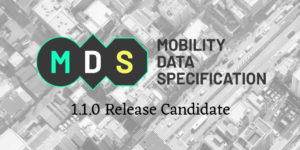Recently, the Open Mobility Foundation (OMF) reached a significant milestone with the completion of OpenAPI definitions for both the Mobility Data Specification (MDS) and the Curb Data Specification (CDS). Here’s what it means and why it is important for cities, mobility providers, and the community.
Decoding OpenAPI Definitions
OpenAPI definitions can be used to build a smarter, more efficient mobility and curb management infrastructure. Imagine you’re trying to assemble a piece of furniture with lots of pieces. Without a guide to show how the pieces fit together, the task becomes difficult. This is where OpenAPI definitions come into play. They serve as a blueprint for building APIs, meticulously detailing how different pieces of online services (like those tracking scooters or managing parking spaces) can connect and communicate without confusion or misinterpretation. These definitions can ensure that MDS and CDS APIs are correctly implemented and everyone speaks the same language.
Why OMF uses OpenAPI for MDS and CDS
MDS and CDS were created to manage urban mobility and curb usage effectively. The OpenAPI definitions for these specifications act as the universal recipe book, enabling various mobility services, city planners, and technology providers to understand and implement these specifications accurately and consistently.
By providing a clear, standardized description of how data should be structured, shared, and used, these OpenAPI definitions ensure that everyone involved in urban mobility—from scooter rental companies to traffic management centers—can “speak the same language.” This facilitates easier integration of services, more efficient data exchange, and ultimately, better management of urban spaces.
Valuable for OMF Members and Beyond
This effort translates into a host of benefits for OMF members and the broader community:
- Streamlined Implementation: Companies and cities can more easily adopt and implement MDS and CDS, avoiding tech debt and reducing development time and costs
- Accelerated Innovation: Developers can quickly understand how to interact with MDS and CDS APIs, speeding up the development of new tools and services that make our cities more livable
- Real-time Validation: Cities and companies producing or consuming MDS and CDS data can use OpenAPI to validate the data feeds in real-time and identify issues immediately
- Enhanced Transparency: Clear, accessible documentation improves understanding and trust among all parties involved, from service providers to regulators to city residents
- Economic Opportunities: For businesses, clear standards open up new possibilities for services that complement public infrastructure, from delivery logistics to mobility-as-a-service platforms
- Future-Proofing: As our specifications evolve, these OpenAPI definitions provide a flexible foundation that can adapt to new technologies and changing cityscapes
Looking Ahead
The publication of these OpenAPI definitions, coupled with accessible documentation through Stoplight, is more than a technical achievement; it’s an example of OMF’s commitment to open source, collaborative development, and a robust volunteer community. Compiler developed the OpenAPI definitions for MDS, and OMF member Passport took the lead and volunteered to create the CDS definitions.
OpenAPI also lays the groundwork for creating open source data validation tools that could be built by anyone in the ecosystem and shared with OMF’ community of users.
As we continually refine and expand our specifications, the potential to transform our cities continues to grow. We invite all OMF members and the wider community to use, contribute to, and build on this work.
Thank you to all those who have contributed in this step towards realizing our vision of smart, sustainable cities – where every stakeholder, from service providers to city dwellers, benefits.




